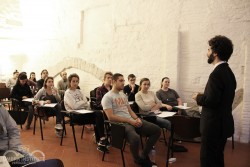Wake Up Europe: Umbra Hosts Film-Screening and Debate

 Prof. Alberto Bitonti introduces the Great European Disaster Movie with the question: “Are you optimistic or pessimistic about the future of the European Union?”
Prof. Alberto Bitonti introduces the Great European Disaster Movie with the question: “Are you optimistic or pessimistic about the future of the European Union?”“Are you optimistic or pessimistic about the future of the European Union?” asked Umbra Professor Alberto Bitonti before a room of 26 Europeans and Americans, students and professors. More than half of those in attendance, mostly Americans, claimed to be optimistic; while the minority, all of which were European, shared a more pessimistic outlook. This question set the stage of the event as the lights dimmed and the Great European Disaster Movie began.
The film, by former editor of The Economist, Bill Emmott, and Italian director Annalisa Piras, exposed five main issues currently ravaging the European Union: economic integration, social welfare, the freedom of movement, equality and democracy, and the realities of peace and war. The film showed the lives of both immigrant and native-born individuals living in Spain, Croatia, Germany, the UK, and Sweden as they confront and express their concern for the current and future state of Europe.

After the screen darkened and the lights came on in Umbra’s Aula Magna, discussion ensued. An audience consisting of Dutch, English, Italian, and American citizens commented on diversity in the EU and debated whether or not terrorism is a dividing or a uniting factor relative to Europe’s current situation. They discussed the issue of complex information and how the average European does not seem to be well-informed of the actions of European Union Organizations. It was acknowledged that the EU institutions are not to blame for all of Europe’s problems and proposed that things could be incredibly worse, as Europe competes with countries like China and Brazil, were it not for the EU’s attempted unity. Other issues such as aging population and welfare were touched upon before participants were asked to consider the exit question: “Now that we have acknowledged numerous issues, what can we do to help fix the problems currently being confronted by EU citizens?”
The film screening was organized by Alberto Bitonti, Umbra’s professor of the History and Politics of the European Union course, along with the Umbra Voice, the Institute’s Journalism and Communications club. Collaboration with RENA (the Network for National Excellence), the University of Perugia, the University for Foreigners, and, of course, Wake Up Europe, led to the overall success of the event.